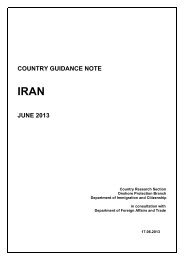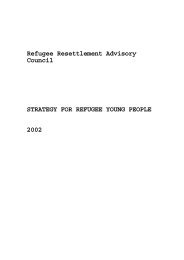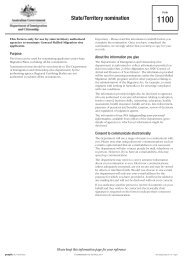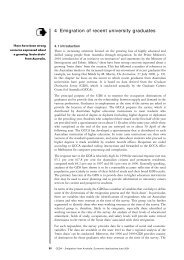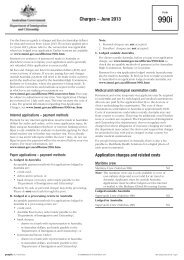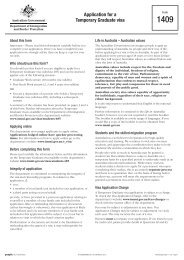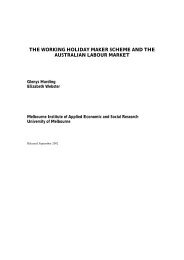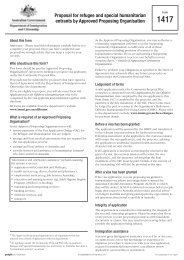Evaluation of the Integrated Humanitarian Settlement Strategy (IHSS)
Evaluation of the Integrated Humanitarian Settlement Strategy (IHSS)
Evaluation of the Integrated Humanitarian Settlement Strategy (IHSS)
Create successful ePaper yourself
Turn your PDF publications into a flip-book with our unique Google optimized e-Paper software.
a<strong>the</strong>r than a standard package based on <strong>the</strong> number <strong>of</strong> people in <strong>the</strong> household. In practice,<br />
however, some service providers supply some goods as a standard package – eg in Adelaide kitchen<br />
and linen packs are supplied prior to <strong>the</strong> family’s arrival, and <strong>the</strong> remainder is provided once a needs<br />
assessment is carried out.<br />
One practical problem experienced by some service providers has been gaining access to families to<br />
conduct needs assessments. Often HFS providers find <strong>the</strong>mselves unable to interview <strong>the</strong> family for<br />
some time as o<strong>the</strong>r needs take priority. This inevitably delays <strong>the</strong> delivery <strong>of</strong> goods to <strong>the</strong> family, as<br />
<strong>the</strong> service provider needs time to locate, purchase and arrange delivery <strong>of</strong> household items.<br />
Some service providers reported that <strong>the</strong>y would prefer to give families a combination <strong>of</strong> money,<br />
vouchers and goods as this provides entrants with choice and enhances self respect.<br />
Barriers to providing goods<br />
Providers reported difficulties in some areas in providing <strong>the</strong> household goods needed. Service<br />
providers in some <strong>of</strong> <strong>the</strong> larger States reported that legislative provisions limit <strong>the</strong> purchase <strong>of</strong> second<br />
hand goods, particularly electrical goods, meaning a larger portion <strong>of</strong> <strong>the</strong> allocation must be spent on<br />
buying new goods.<br />
It is also difficult to find quality second hand goods in some areas – particularly in regional areas<br />
where options are limited, and in some metropolitan areas where demand for second hand goods<br />
exceeds <strong>the</strong> supply <strong>of</strong> <strong>the</strong>se goods.<br />
Service providers have also found that clients <strong>of</strong>ten compare <strong>the</strong> goods <strong>the</strong>y receive under HFS and<br />
ask for similar things. For this reason, in small regional areas, service providers <strong>of</strong>ten have to provide<br />
goods <strong>of</strong> similar standards, regardless <strong>of</strong> need. Where volunteers are asked to deliver this service,<br />
trying to access goods <strong>of</strong> similar quality in areas where this might be limited places huge burdens on<br />
volunteer capacity.<br />
Top-up goods<br />
It is an expectation <strong>of</strong> <strong>the</strong> service that community organisations will continue to supplement HFS<br />
goods in <strong>the</strong> normal course <strong>of</strong> <strong>the</strong>ir work. However, in practice, this does not always occur. On some<br />
occasions this has been because <strong>the</strong> goods are not available. In some instances o<strong>the</strong>r community<br />
organisations do not assist because <strong>the</strong>y perceive that this is <strong>the</strong> job ano<strong>the</strong>r service provider is paid<br />
to do. Where <strong>the</strong> delivery <strong>of</strong> HFS was divided up among different community organisations and <strong>the</strong>ir<br />
volunteers, which had variable resource bases, some groups were in a better position than o<strong>the</strong>rs to<br />
‘top up’ goods.<br />
The assumption that HFS goods will be ‘topped up’ results in some families waiting unreasonable<br />
periods <strong>of</strong> time to receive some basic items.<br />
Service provider’s capacity<br />
Some service provider indicated that <strong>the</strong>y do not have adequate capacity to purchase – <strong>the</strong>n store<br />
and deliver-goods. In particular, when bulk purchases are made <strong>the</strong>re were some concerns (and<br />
costs) associated with storing goods until <strong>the</strong>y are required.<br />
45<br />
<strong>Evaluation</strong> <strong>of</strong> <strong>the</strong> <strong>Integrated</strong> <strong>Humanitarian</strong> <strong>Settlement</strong> <strong>Strategy</strong> 27 May 2003



